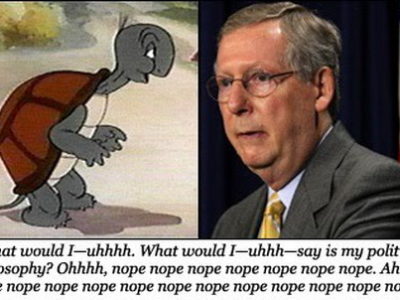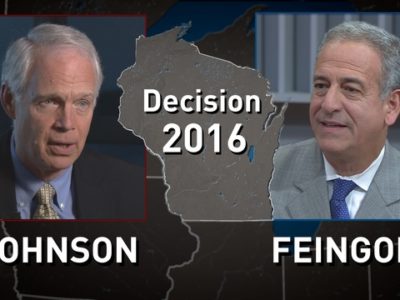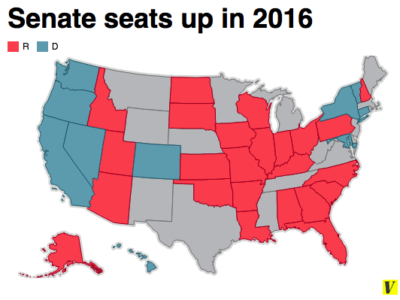Month: September 2016
Will We Get a Ninth Supreme Court Justice?
Not if Clinton Wins the President and the GOP Maintains Control of the Senate
Dan’s march through the Senate, and his fine post today on Wisconsin, might even be more significant than says. He writes: A President Trump with a Republican Senate could do a lot to carry through on his pledge to dismantle EPA’s powers, whereas a President Clinton would receive valuable support from a Democratic Senate. If …
Continue reading “Will We Get a Ninth Supreme Court Justice?”
CONTINUE READINGBattle For the Senate: Wisconsin
The candidates’ views on energy and environment are diametrically opposed.
Wisconsin is first up in a series of posts on key Senate races. My goal is to describe the candidates’ views on key policy issues, not to make a case for either side. The Wisconsin race is a rematch between the incumbent Ron Johnson and the previous incumbent, Russ Feingold, whom he had defeated in …
Continue reading “Battle For the Senate: Wisconsin”
CONTINUE READINGGreat environmental law scholarship
Some of the best articles in the field from 2014-15
Some of our readers may be interested in what is happening in environmental legal scholarship. So I thought I’d post about the Land Use & Environment Law Review, which is Thomson Reuters/West Publishing’s peer-selected annual compendium of significant legal scholarship in land use and environmental law. About sixty reviewers (made up of environmental law professors) …
Continue reading “Great environmental law scholarship”
CONTINUE READINGGary Johnson’s Hasty Retreat
He was for a carbon tax. For a few days. Until he was against it.
I posted a few weeks about Gary Johnson’s embrace of a carbon fee, which seemed like an appealing sign of new ideas. Apparently, however, stale ideas are more politically salable. As it turns out, under pressure from horrified conservatives, Johnson waved the white flag and surrendered only a few days later. Here’s his explanation: “If …
Continue reading “Gary Johnson’s Hasty Retreat”
CONTINUE READINGWhat is the Price of Equality?
Do Local Land Use Regulations Violate the Fair Housing Act?
One of the great things about studying land use is that it comprises so much of modern life. That creates some disciplinary problems: one UCLAW colleague who shall remain nameless (but comes from Pennsylvania) told me several years ago that he didn’t think land use was part of environmental law at all. (He has since …
Continue reading “What is the Price of Equality?”
CONTINUE READINGThe Battle for the Senate: Eight Key States
The outcome of these races will have a major impact on environmental policy.
As important as the presidential election is, the presidency isn’t the only important federal office at stake. This year, an unusual number of Senate races could go either way, and control of the Senate hangs in the balance. The Democrats need to pick up 4 seats (if Kaine is VP) or 5 (if Pence is VP). Over …
Continue reading “The Battle for the Senate: Eight Key States”
CONTINUE READINGHow to Hedge Your Portfolio Against a Possible Trump Victory
Place your financial bets on having LESS renewable energy and MORE climate change.
If you’re worried about the economic impact of a Trump victory, you should be thinking of hedging your risk. One hedging strategy is to place a bet on climate change. By undoing Obama’s climate regulations and scuttling the Paris Agreement, Trump will set back climate policy, here and around the world by years, maybe decades, He’ll …
Continue reading “How to Hedge Your Portfolio Against a Possible Trump Victory”
CONTINUE READINGThe Future of Environmental Law?
Thoughts from the IUCN World Conservation Congress in Hawai’i
I am writing this weekend from a sunny spot in the Pacific, from the IUCN World Conservation Congress in Honolulu. For the uninitiated, the IUCN—International Union for Conservation of Nature and Natural Resources—is a global union of governments and non-governmental organizations (including over 1300 member institutions, organizations, and countries worldwide) focused on the conservation of …
Continue reading “The Future of Environmental Law?”
CONTINUE READINGOf Pipelines, Protests, and General Permits
A fight in North Dakota reveals problems in how we permit and review large infrastructure projects
Native American tribes and environmental groups are currently protesting the completion of an oil pipeline in North Dakota. The pipeline would travel beneath the Missouri River. Tribes and environmentalists are fighting the pipeline both through litigation and also through direct action (occupying the site where the construction to complete the pipeline beneath the river would …
Continue reading “Of Pipelines, Protests, and General Permits”
CONTINUE READING










